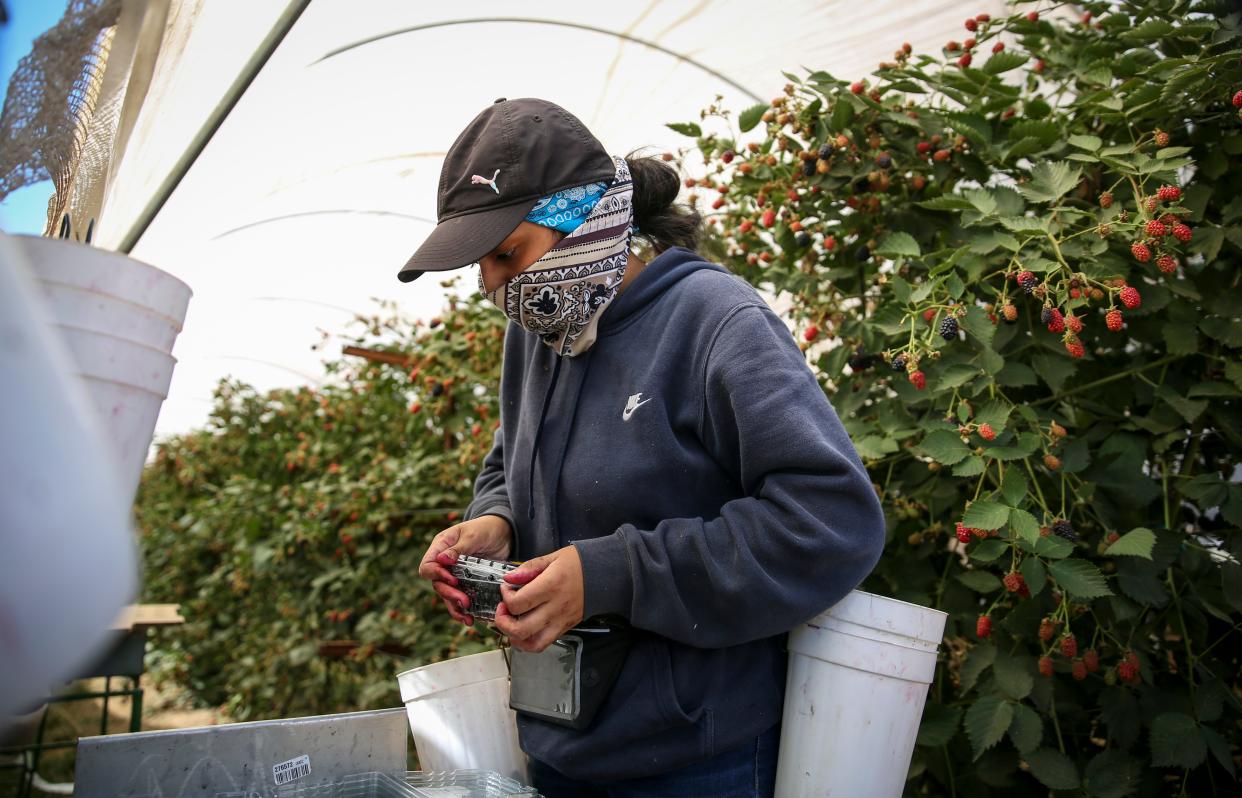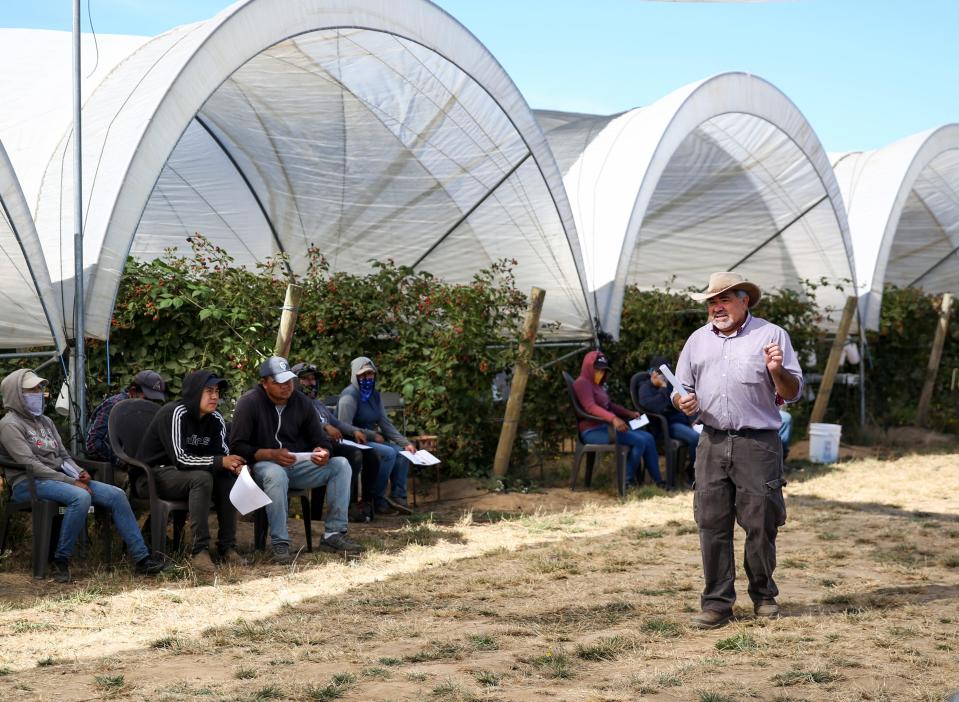Farmworker advocates prioritize language access and work hazards at the legislature

A handful of bill that Oregon lawmakers will consider this year could directly impact Oregon's agricultural workers and their employees.
While none of the bills are as high-profile as the agricultural overtime bill which was passed last year, their implications are diverse. Among them are bills to expand access to Indigenous language interpretation and a proposal to give workers the right to refuse dangerous work.
Here's a look at legislation that farmworker advocates are pushing for - or fighting against - this session.
Indigenous language access
SB 612 would establish an Indigenous Language Justice Fund to pay for Indigenous language interpretation. The bill would allow nonprofits in Oregon that address worker relief to receive money from the fund to finance interpretation services or develop guidelines for Indigenous language interpretation.
According to a survey of farmworkers in Oregon, farmworkers speak at least 25 Indigenous languages. There are at least 15 Indigenous languages spoken in Marion County.
But there is rarely access to Indigenous language interpretation, said Cam Coval, executive director of Pueblo Unido. Instead, agencies that require interpretation often default to Spanish.
Pueblo Unido helps connect Oregonians facing deportation to legal representation and financial assistance. The nonprofit handles high-stakes cases. Offering Spanish interpretation to a client whose first language isn’t Spanish, Coval said, doesn’t cut it.
“We’re talking about asylum claims,” Coval said. “It’s not sufficient.”
Pueblo Undio started building a coalition of Indigenous language interpreters across the state, but there were barriers for the interpreters, too. For one, Coval said, technical interpretation, like for medicine or legal proceedings, requires certain certification that isn’t always available for Indigenous languages.
Indigenous language interpreters also are often themselves Indigenous language speakers from low-income communities. Interpreters in Pueblo Unido’s coalition reported begin underpaid or even working for free. On the other hand, people who need Indigenous language interpretation shouldn’t have to shoulder the cost, Coval said.
The state has a stake, too, Coval said, because language access is “essential to the obligations the state has to its constituents.”
State employment agencies such as BOLI and Oregon OSHA require employers to post safety information and employee rights in a language employees can understand.
Farmworkers who speak Indigenous languages are being missed, said Ira Cuello-Martinez, interim executive director at PCUN. And in a state that relies heavily on its agricultural workforce, Oregon has a chance to “really show leadership.”
Coval said he hopes SB 612 helps bridge the gap between people who need Indigenous language interpretation and those who can provide it.
“As demand for the service has grown, there needs to be a public solution,” Coval said. That’s the crux of SB 612.”
Sen. Deb Patterson, D-Salem, and one of the bill’s sponsors, said in a statement: “The ability to be understood and to understand is fundamental to the ability to live a full life,”
Right to refuse work
PCUN, Oregon’s farmworker union and nonprofit lobbyist organization, is prioritizing a bill that would codify protections for workers who refuse to work in hazardous conditions.
The law already exists on a federal level. Workers have a right to report hazardous work conditions without retaliation, but they also have the right to refuse work if hazardous conditions exist, workers have brought the hazard to their employers’ attention, and OSHA cannot inspect the workplace on time.
Most states, including Oregon, copy the federal rule. The problem, Cuello-Martinez said, is the federal rule is hard to exercise. The standards for proving hazardous work are high, and protection against employer retaliation is insufficient.

A state-wide rule would clarify workers’ rights to refuse hazardous work and offer added protection against employer retaliation.
“We’re not trying to create something that is new,” Cuello-Martinez said. “We’re just trying to simplify and clarify what rights workers already have.”
California has its own version of the rule. Washington state has a rule that protects workers from discrimination for refusing to do dangerous work.
The rule would apply to all sectors of employment, not just agricultural labor. But agricultural employers are especially exposed to hazardous conditions, Cuello-Martinez said: heavy machinery, pesticide exposure, extreme weather. A farmworker died in 2021 after working at a nursery during a record-breaking heatwave on a day that temperatures surpassed 110 degrees.
“We don’t want to see [farmworkers] die or get seriously injured,” Cuello-Martinez said. “It has a serious impact on families who already have financial instability. It puts them in a dire situation.”
The rule is still just a legislative concept – it has not yet been formally introduced. But PCUN found a handful of sponsors willing to bring it forward, including Sen. Patterson. It is expected to be assigned soon.
Patterson said Oregon lawmakers have an “obligation” to protect Oregon workers.
“[Legislative concept] 2224 would give workers the right to leave or refuse to report to work ‘due to emergency circumstances or dangerous conditions, and allows sick time, PTO or vacation time to be used to protect a worker’s pay in these situations,” Patterson said in a statement. “Oregon frontline workers are increasingly at risk of illness and death on the job due to climate-related occurrences, exposure to unsafe equipment, evacuation zones, or other work hazards.”
Farmworker overtime repeal
Agricultural overtime just took effect, but some lawmakers are trying to make sure it never reaches its 40-hour threshold.
Senate Bill 448 would repeal the overtime law passed in last year’s legislative session. The law took effect this January.
As written, the law eases into the number of worked hours required to pay agricultural employees overtime wages. The threshold is currently 55 hours per week; by 2027, it will have dropped to 40 hours per week.
“It’s in its first year of implementation, there is no basis to restart a discussion that we went through last legislative session,” said Cuello-Martinez of PCUN.
Agricultural employers likely will not see the impact of overtime on their bottom line until harvest, when workers typically put in the most hours. And the phased implementation will delay any serious impacts even further, Cuello-Martinez said.
“At this threshold, we really won’t get a sense of the impact until years down the line.”
The bill's chief sponsor, Sen. Daniel Bonham, R-The Dalles, did not respond to requests for comment.
Pesticide outreach
House Bill 3098 would create a farmworker outreach program for pesticide training and safety. The program would be managed by the Oregon Department of Agriculture and the Pesticide Analytical and Response Center.
Ongoing aid for farmworkers
Oregon lawmakers approved a special drought package in 2021 to support the agricultural industry in a climate emergency. Of the $100 million package, $10 million was dedicated to a relief fund for farmworkers who lost income due to heat or smoke.
Cuello-Martinez said he hopes the current legislature will continue to support farmworkers impacted by a changing climate. He also hopes to expand the definition of extreme weather conditions to include events like winter storms or floods.
Summer isn’t the only dangerous season, Cuello-Martinez said.
Shannon Sollitt covers agricultural workers through Report for America, a program that aims to support local journalism and democracy by reporting on under-covered issues and communities. Send tips, questions and comments to ssollitt@statesmanjournal.com.
This article originally appeared on Salem Statesman Journal: farmworker advocate legislative priorities include language access

